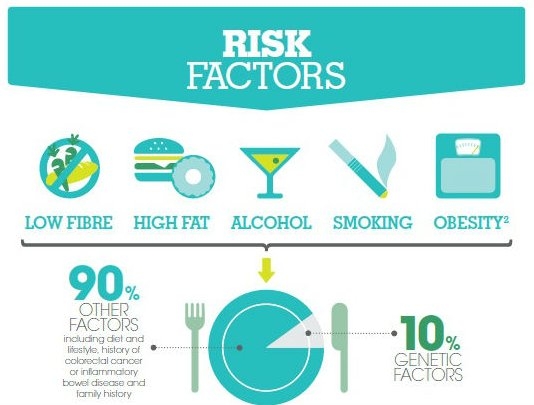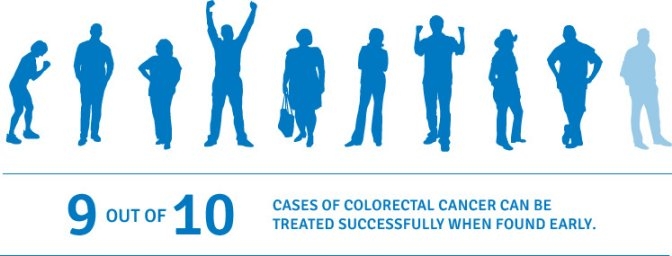Cancer of any kind is daunting, but Ontario’s rates of colorectal cancer in particular are among the highest in the world
[1]. The statistics are scary: In 2015, one in fourteen men and one in sixteen women will be diagnosed with colorectal cancer. 7,000 new cases will be diagnosed in people aged 70-79. In
Ontario specifically, there were 9,200 estimated new cases in 2015, with over 3,000 deaths
[2]. Getting the right information about treatment and prevention can help those, especially in an aging population, become aware of risks.
Cancer, in general, is caused by abnormal growth of cells. Colorectal cancer is a
malignant tumor in the colon (large intestine) wall
[3]. Some tumors that arise in the colon are not malignant; these are called
polyps [4] - however cancers can eventually develop from polyps, so screening is important
[5]. Most colorectal cancers start in the gland cells of the colon wall—the cells that are responsible for releasing mucus into the colon to help solids move smoothly
[6].

The symptoms of colorectal cancer are broad. They can range from “
milder” symptoms like fatigue, weight loss and bloating to “
serious” symptoms like bloody stool, diarrhea and irritable bowel syndrome. Because not everyone may experience the serious symptoms, colorectal cancer can exist for years before those symptoms develop, let alone before diagnosis. Also, the prevalence of the symptoms will depend on where in the colon the cancer is
[7].
If you can, you should
screen for colorectal cancer. If the cancer is caught early, before the tumor develops, you are more likely to recover. In addition, the cancer is less likely to spread (metastasize) and there are more options for treatment. Ontario has a screening test called the
Fecal Occult Blood Test (FOBT), which should be taken every two years by those aged 50 to 74. This test is simple and can be done at home, after which the kit must be mailed one month before its expiry date. If you’re already experiencing symptoms of colorectal cancer, don’t take the test. If your test comes back negative—nothing to worry about, just take the test again in another two years. If your test comes back positive, a follow-up colonoscopy is recommended
[8]. For those already diagnosed, treatment of colorectal cancer depends on many factors: location and size of malignant tumor, as well as if its spread. In addition, the health of the patient may impede some treatment options. The most common treatment is surgery, as well as chemotherapy
[9].

So how can you prevent colon cancer? In addition to screening for early detection, regular exercise lowers your risk, as well as reduced alcohol intake and not smoking
[10]. Leading a healthy life can help to prevent a host of diseases, but cancer is among those that have touched the lives of many people, and should be avoided—and educated about—as much as possible.

 The symptoms of colorectal cancer are broad. They can range from “milder” symptoms like fatigue, weight loss and bloating to “serious” symptoms like bloody stool, diarrhea and irritable bowel syndrome. Because not everyone may experience the serious symptoms, colorectal cancer can exist for years before those symptoms develop, let alone before diagnosis. Also, the prevalence of the symptoms will depend on where in the colon the cancer is [7].
The symptoms of colorectal cancer are broad. They can range from “milder” symptoms like fatigue, weight loss and bloating to “serious” symptoms like bloody stool, diarrhea and irritable bowel syndrome. Because not everyone may experience the serious symptoms, colorectal cancer can exist for years before those symptoms develop, let alone before diagnosis. Also, the prevalence of the symptoms will depend on where in the colon the cancer is [7].
 So how can you prevent colon cancer? In addition to screening for early detection, regular exercise lowers your risk, as well as reduced alcohol intake and not smoking [10]. Leading a healthy life can help to prevent a host of diseases, but cancer is among those that have touched the lives of many people, and should be avoided—and educated about—as much as possible.
So how can you prevent colon cancer? In addition to screening for early detection, regular exercise lowers your risk, as well as reduced alcohol intake and not smoking [10]. Leading a healthy life can help to prevent a host of diseases, but cancer is among those that have touched the lives of many people, and should be avoided—and educated about—as much as possible.